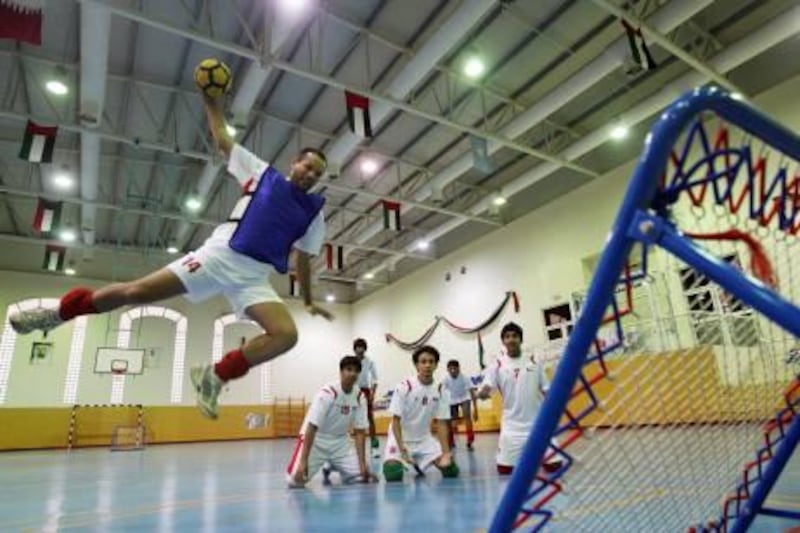SHARJAH // The UAE tchoukball team, the only team in the Arab world, are currently competing at an international tournament in India - but you'd be forgiven for not knowing that.
To be fair, you would be forgiven for not knowing what tchoukball is at all, especially in this part of the world. The sport, pronounced "chuke-ball", was conceived in the 1970s by the Swiss biologist Hermann Brandt, who wanted to develop a game that was accessible, tactical and promoted the concept of fair play without compromising on the intensity required to play.
Mr Brandt believed the objective of physical activities was not to make champions, but to contribute to building a harmonious society.
Each tchoukball squad consists of 12 players (nine on the field at any time) who compete on a court recommended to be 40 by 20 metres, with inclined trampolines as a goal at either end.
The attacking team score when they pass the ball and shoot it off the trampoline net in such a way that the ball lands outside a semi-circular perimeter before the other team catches it. If it lands outside the court without being caught, the other team score. Oh, and you can score at either end, anytime.
Understand? Well that's the gist of the game that incidentally has been described as a mixture of handball, volleyball and squash. "Players have to run, jump, catch, co-ordinate and strategise during the course of the game, so it is very challenging," Julio Calegari, the coach of the UAE team, says helpfully.
Convincing the football-mad youth of the UAE to adopt this obscure game where interceptions and tackles could lead to penalties and where the rules defy most preconceptions of team sport was no easy task, but there must be real appeal because today the national team are competing against countries that have been playing the sport for more than a decade.
The UAE team will also tour the Gulf this year to promote the game in other Arab countries. "We will be demonstrating tchoukball and making presentations in Qatar and Oman this year," Mr Calegari says.
The UAE team are in India for a friendly series against the host nation, which started on Tuesday and finishes today. Players have undergone training with Federation Internationale de Tchoukball (FITB) during their stay, in preparation for next year's international finals.
The rugby player and university student Mohammed Adil al Sulaiman is a member of the national team and says he has to take his "war zone" tactics down a notch when he steps on to the tchoukball court. "Here, there is more co-operation and unity involved. A lot of hand movement and angles have to be taken into consideration instead."
Despite displaying their prowess as a young team at the 2008 Asian Championships - where they finished fifth in the adult category and beat Taiwan and Singapore in a couple of individual matches - recognition has so far eluded the UAE team. But, to be fair, the sport is still very much in its infancy here. Mr Calegari, who is the director of international development with the FITB, brought tchoukball to the UAE in 2007. It was first played by high school students at the Al Khaleej School in Sharjah.
Zaghdoud Mohamed, the physical education supervisor for the Sharjah Education Zone, is responsible for promoting the sport in schools, and believes more national support is required.
"We have such strong players but no national federation to help us with sponsorships and budgets for tournaments and training," he says. "Not many people know about the sport and that is why it is not recognised at a national level."
Mr Mohamed says the UAE team are being sponsored by the Sharjah Education Zone and have approached the Dubai Sports Council for backing too.
"If we have an association, it will help strengthen the team and we will be able to create our own logo as well," he says.
In January, the team plan to invite Pakistan to the UAE for a friendly match series.
Rules of the obscure game
- Two teams of nine players each compete to score points on a court measuring 40m x 20m.
- To score a point a ball must be thrown at either of the two 90cm square trampolines at each end of the court so that it rebounds outside the 3-metre D-shaped goal area before a member of the opposition can catch it. The defending team score apoint if a player of the attacking team misses the frame, or if the ball touches the ground outside the court before or after the bounce.
- A player can take three steps and is not allowed to bounce the ball on the ground between these steps.
- The attacking team cannot make more than three passes before shooting.
- When a pass is dropped or not completed, the other team get possession.
- A match should last for three periods of 15 minutes for men and 12 minutes for women and children.






